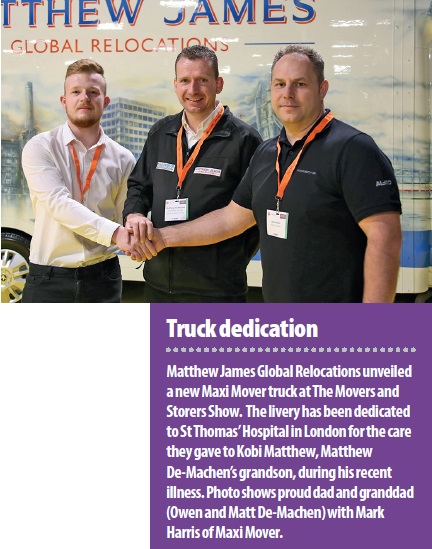The Movers & Storers Show 2018 was helt at Event City, Manchester, on 21-22 November, 2018.
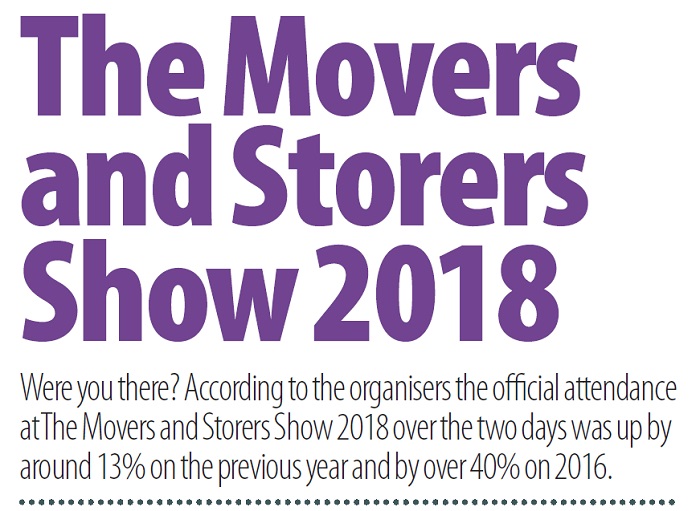
Some might have felt it quieter but the venue at Event City in Manchester was cavernous and the visitors came in a steady stream which, perhaps, contributed to a more relaxed feel.
More importantly than the absolute numbers clicking through the door is the reaction from exhibitors. The Mover has not spoken to all the 50+ exhibitors however those interviewed did report brisk business, if not throughout the whole event, certainly enough to justify the considerable effort in attending.
As well as the opportunity to network and talk to suppliers the show offered its now familiar competitions sponsored by Britannia: the Packer of the Year and Britain’s Strongest Mover.
The packing competition involved completing a three-dimensional jigsaw of packages into a storage container in the fastest time.
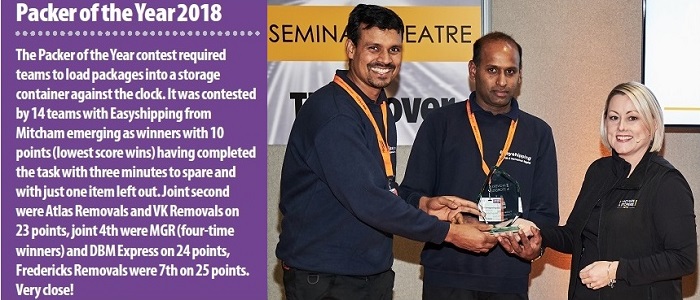
Photo: Packers of the Year 2018, Easyshipping from Mitcham, receiving their trophy from Charlotte Parslow, Animo Events.
The strongman competition just required participants to deadlift 300kg as often as possible in a minute; load sand bags of increasing weight (up to 100kg) onto a platform; then pull a removals truck singlehanded. Fortunately, all was under the watchful eye of Faye Jordan and Andy Champ from Champion Strength and Conditioning gym in Milton Keynes, both British champion powerlifters, so nobody got hurt and nobody cheated!
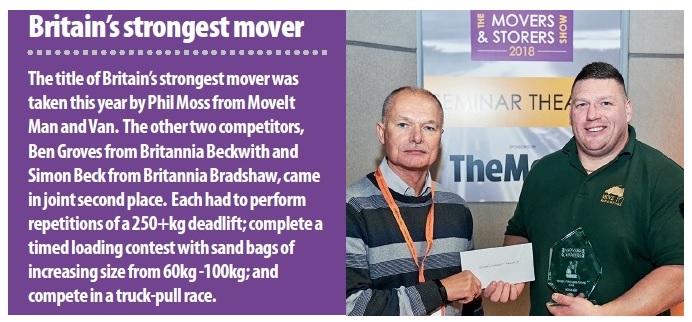
Photo: Phil Moss, Britain's Strongest Mover 2018, receiving his trophy from Mark Tresler of Britannia International.
The Seminar Theatre, sponsored by The Mover magazine was very well attended over the two days with David Jordan hosting day one and Steve Jordan day two.
Day one kicked off with SEO fundamentals for beginners from Nazam Noor, a digital strategist for Manchester-based digital marketing company CandidSky, who were exhibiting at the show. Her presentation focussed mainly on Google, which is currently estimated to have around 80% of the UK market. Nazam stressed the importance of thinking carefully about what customers are likely to be searching for and the need to use plain language rather than industry jargon when populating websites. The three keys to success are relevance, authority and technology. Nazam used the example of someone looking for short-term storage in Manchester. First of all, Manchester and short-term storage obviously need to feature prominently in the text, but this needs to be backed up with evidence that you know what you’re doing. Testimonials, membership of trade organisations, awards, etc. all need to be included. Finally, your website needs to be attractive and easy to navigate in order to give the customer a good experience and consequentially please Google.
Mark Bonard, Business development Manager at Currencies Direct, explained how even the jobs you don’t get can sometimes provide revenue by offering customers moving abroad a way of saving money on currency transactions. Mark explained that Currencies Direct is not a bank but a payment company that transfers money from one country to another. Anthony Jenkins, former CEO of Barclays, is their chairman and they handle over £6 billion worth of currency a year. By introducing people moving abroad, your clients can save 3% to 4% on their currency transfer and simply by making the introduction you can make 20% of Currencies Direct’s profit, equating to around £300 for every £100.000 transferred. In many cases the saving made by the client can pay for the move.
James Backhouse, Director and Solicitor of transport specialist Backhouse Jones took to the stage to talk about the importance of managing tachographs. James said that surprisingly there is no official guidance on how to comply with drivers’ hours tachograph rules. However, breaches of tachograph compliance can result in fines of tens of thousands of pounds so proper records must be kept. James stressed the need for journey planning by a competent person to avoid know traffic hot-spots which could cause a driver to exceed his hours. Every driver should undergo an induction process with particular emphasis on driver’s hours record keeping. Vehicles must have the correct type of card or disc. James also highly recommended electronic checking of driver related data, driving licences, tacho information and CPC records, etc. rather than using manual systems. Manual checking is seriously out of date and systems are now relatively cheap. James urged anyone still using manual checking to sign-up for a digital service right away.
Staying on the subject of operating trucks Simon Evans, Traffic Commissioner for the North West of England, spoke about the dangers and consequences of overloading. Regularly checking the weight of a vehicle after loading using a weighbridge and retaining the evidence will demonstrate to inspectors that you take loading seriously and may help in any subsequent investigation. Simon them moved on to more general matters that can result in operators being prosecuted for non-compliance. Simon emphasised the importance of retaining an operator’s licence for someone in the moving industry and suggested a risk-based approach to compliance. In other words, what will put your licence at greatest risk? Poor communications between the transport manager, other managers and drivers and the remote location of those people was one of the most common elements in non-compliance, he said. Exceeding drivers’ hours, overloading, unroadworthy vehicles and failure to keep proper records of maintenance and defect reporting were also common reasons for
operators being prosecuted and possibly losing their O licences.
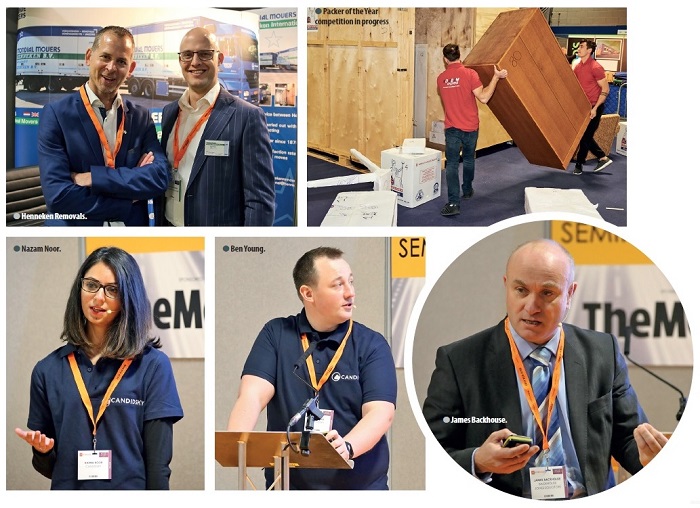
The afternoon session began with a panel discussion about retaining European staff after Brexit. The panel comprised Mario Amato from White & Co; Ian Studd, Director General of BAR and James Backhouse from solicitors, Backhouse Jones.
The panel agreed that the uncertainty of Brexit and the feeling of being unwelcome in the UK was causing many EU nationals to leave. Ian Studd pointed out that there was already a 55,000 shortfall in the number of HGV drivers across all sectors and that could only be exacerbated by the current situation. Mario Amato drew the audience’s attention to the free leaflets printed in 27 languages by the Home Office giving advice and guidance on how to apply for Settled Status and encouraged employers to assist their employees in obtaining them. James Backhouse said it was important to remember there would be no changes in EU citizens’ right to work in the UK until 2021 and that they have until the end of 2020 to apply for Settled or Pre-Settled Status, so there was no need to panic.
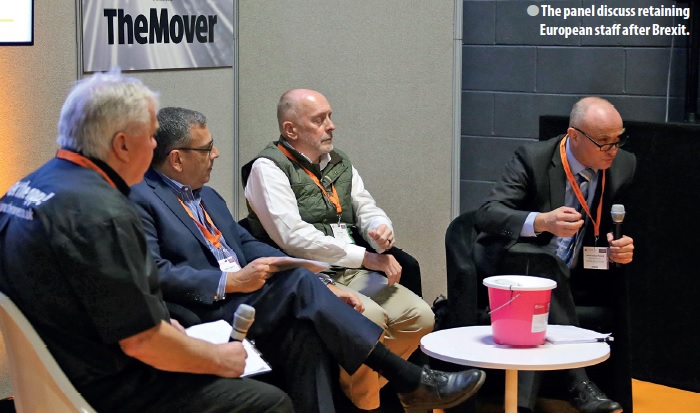
The final presentation of the day was given by Steve Jordan, Editor of The Mover Magazine.
Steve talked about how to get stories in the press to gain free publicity for your products or services. Steve outlined the difference between advertising and editorial and how editors decide what to print and what to reject. He also contrasted mainstream media with social media and how professional editors have a responsibility to make sure the stories they publish are accurate and truthful. Steve also gave valuable tips on how to put a story together to make it as easy as possible for the editor to use and the importance of including a good high-resolution picture.
Day two started with Chris Buckingham from reallymoving.com looking at the impact of new technology on moving and self storage. Chris discussing some of the technological opportunities that are currently available for movers. He mentioned digital searches, pay per click, social media and video surveys saying that he believed those companies using a higher level of technology in their businesses were seeing a marketing advantage. He also suggested that dynamic pricing might become more common in the future as technology allowed movers to adjust their prices more easily in line with demand.
Ben Young from Candidsky presented his talk on how to run a successful Google Ads campaign. He said that there were 70,000 searches a second on the Internet with 80% of them on Google. Google Ads is a very effective, measurable form of advertising that allows you to segment your market and understand your customers better. He provided a number of tips on how to get the best out of a Google Ads campaign including, for example, using location-based keywords to bring in enquiries from the widest possible area, should that be important to you. Interestingly Ben said that it was important, when deciding what to say on your advert, to include what the customer needs to know, not what you want to tell them.
First impressions count so Richard Annable from Kapok88 asked delegates to think beyond branded boxes and uniforms. His company provides drapes for lifts which, he said, helped moving companies create a good first impression by demonstrating that the company not only cares about the client’s goods, but also wants to avoid damage to the lift as well. More generally Richard encouraged companies to look at every aspect of their work and see where marginal improvements could be made. Making small improvements throughout the business can make a big difference in the way the company is perceived.
The Friday morning panel discussion explored the topical issue of whether £40/item liability limit is the right figure as it was originally set around 26 years ago. The panellists were Ian Studd, Director General of BAR; Peter Doman from Basil Fry & Company; and Malcolm Pearson from Reason Global Insurance. The conclusion was that £40/item is probably sufficient as it is based on second-hand values which are low and, when multiplied by the number of pieces would usually amount to more than the contract price. It was very important to make sure that the customer was fully aware of the limit before signing the contract. Each mover was at liberty to increase the limit if necessary and customers were able to take out additional insurance if they wished.
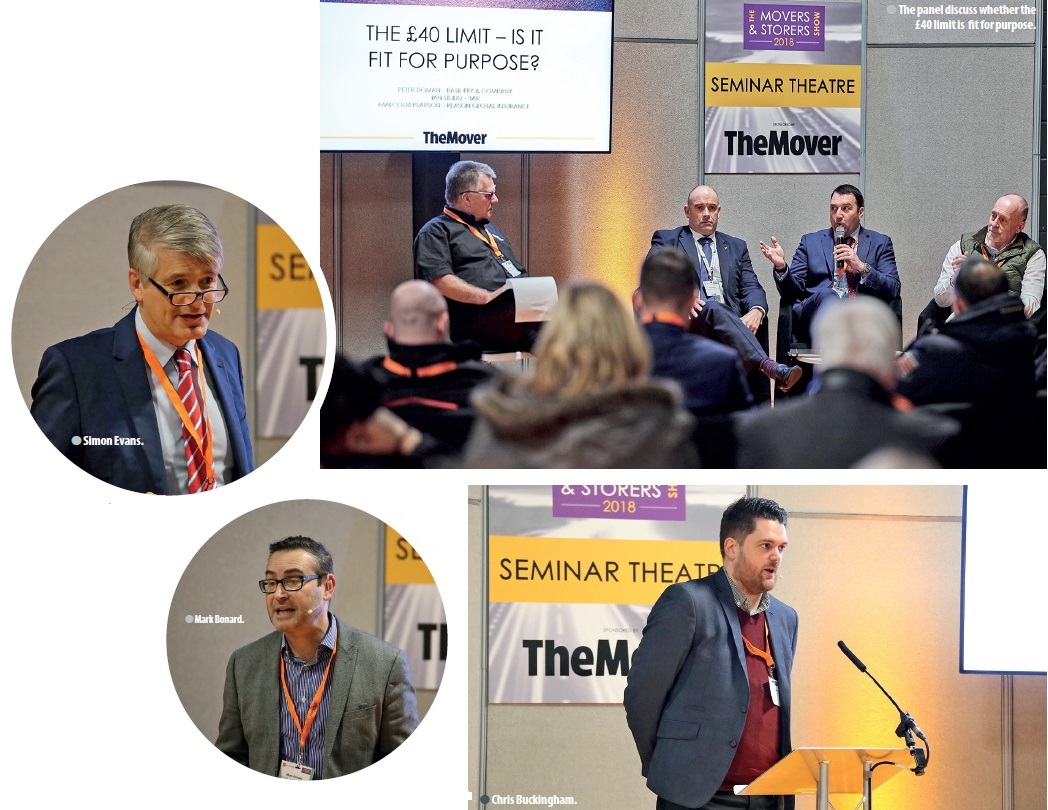
The afternoon discussion looked at some of the Headaches in the moving industry. Robert Bartup from GB Liners, Jonathan Bramwell from Bramwell Relocation, Eric Bourne from Bournes Moves, Andrew Waddington from Stubbs Removals and Matt Faizey from M&G Transport all chipped in with their own horror stories. Robert disliked ungrateful customers, Matt wanted to educate customers and change the image of the industry, whereas Eric, Jonathan and Andrew all were plagued by tumbling prices. There were plenty of grumbles from the audience too, but few solutions.
The final session in the Seminar Theatre was from David Jordan, Deputy Editor of The Mover who, following Steve’s presentation the day before about getting press coverage, gave some advice about how to take photos that were likely to be picked up by magazines and newspapers. David showed examples of the good and the bad and explained that having a good picture dramatically increased your chances of getting stories published. Simple tips such as getting the light source behind the camera, checking to make sure the image is in focus, making the people the subject of the image, and providing a high-resolution picture were high on the list.
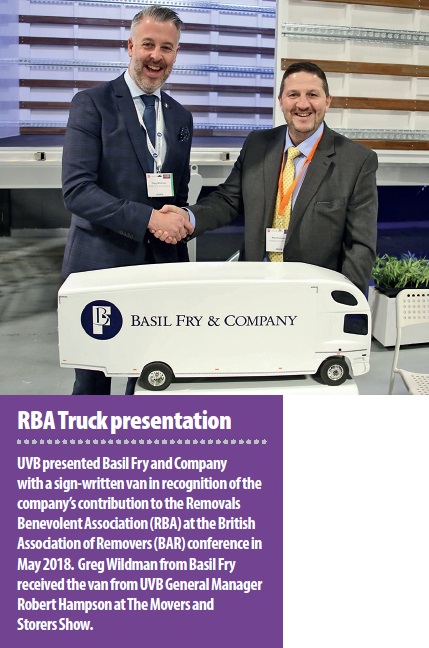
Throughout the two days the Seminar Theatre promoted the show’s adopted charity Prevent Breast Cancer. Presenters Sarah May and Angela Wrobel explained that one in nine women and one in 1000 men contract breast cancer. Their presentations raised awareness of the cause while collections were made around the hall over both days.
